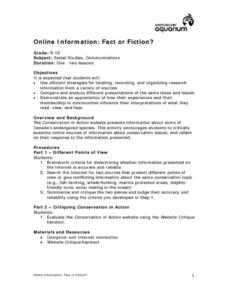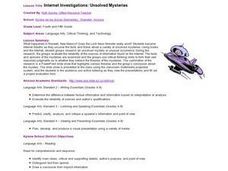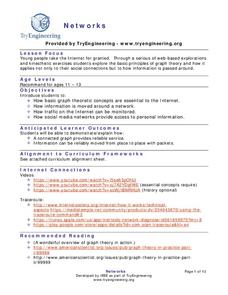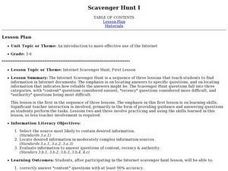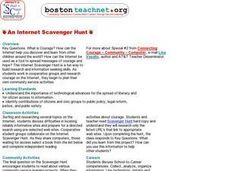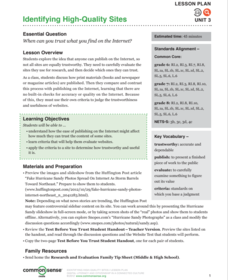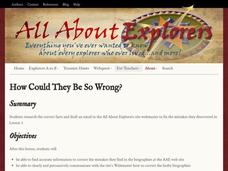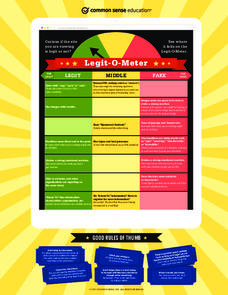Curated OER
How to Locate and Evaluate Information, Part III - Internet Sites
This is the third in a series of lessons scaffolding the research paper. It purports to teach researchers how to evaluate internet sites, but the lack of links, specific criteria, or site evaluation rubrics would require additional...
Curated OER
Use the New Internet Library for Adult Learners
Adult learners, examine the Internet to answer life skills, use an online dictionary, evaluate web sites and fill in online forms. They will also write about web sites in this series of activities.
Code.org
Packets and Making a Reliable Internet
That's not what I said! My message did not arrive in the correct order! Introduce the concept of packets and the transmission control protocol used to send and receive information over the Internet. The class participates in an unplugged...
DirectTV
Staying Safe on The Internet
Watson the Walrus takes scholars through an interactive workbook all about internet safety. Safety tips, a maze, crossword puzzle, quiz, and coloring page make up six pages that encourage smart choices while surfing the web.
Code.org
Practice PT - The Internet and Society
Speaking of the Internet. The culminating lesson for the unit on the Internet challenges pupils to prepare short, two-minute speeches on an issue facing society. The pupils chose from three topics that connect the Internet and society,...
Curated OER
Credible Sources on the Internet: What to Trust, What to Dismiss and When to Cite a Source
Wait, you mean researchers don't all use Wikipedia? Teach your class about intelligent research with a lesson about evaluating digital sources. The lesson starts with a quickwrite and includes vocabulary exercises and several...
Curated OER
Taming the Wild Wiki
Take a look at the credibility of online sources such as Wikipedia. Discussion points and handouts are included to facilitate a meaningful and informative dialogue. Tips are given on how to determine if a Wikipedia article is reliable...
Curated OER
Online Information: Fact or Fiction
Discuss ways to determine if the information middle and high schoolers gather online is accurate. Using the Internet, they cite two sources that show conflicting points of view on a subtopic of conservation. They summarize and analyze...
Curated OER
Digital Curation: Life and Times of Mark Twain
By digitally organizing research, your class leaves a legacy for future students on the life and times of Mark Twain. Before reading The Adventures of Tom Sawyer, scholars conduct group research projects on one of six (listed) topics....
Southern Poverty Law Center
Choosing Reliable Sources
It is more important than ever that 21st-century learners develop the skills they need to become savvy consumers of media. Young learners locate and identify reliable sources of information with a helpful media lesson.
Southern Poverty Law Center
Evaluating Reliable Sources
A lesson plan instills the importance of locating reliable sources. Scholars are challenged to locate digital sources, analyze their reliability, search for any bias, and identify frequently found problems that make a source unusable.
Curated OER
Internet Investigations: Unsolved Mysteries
Students conduct Internet research to investigate the facts and fiction of various unsolved mysteries. They examine the facts and opinions of the mysteries, and create a Powerpoint slide show to present the theories and the group's...
TryEngineering
Networks
Ever wonder how the Internet works? The lesson teaches scholars the basics of graph theory and how it applies to the Internet. They perform simulations to see how information is sent on the Internet.
EngageNY
Gathering Information about Water Management: Assessing and Reading Internet Sources, Day 2
Accuracy, credibility, timeliness ... it's time to act on source reliability! Pupils continue conducting Internet research, selecting two questions about water management from their researcher's notebooks that they want to explore...
Curated OER
Cyber Safety
Students explore internet safety. In this cyber safety lesson, students gain information on how to choose safe websites. Students get tips on what types of information is safe to share on the internet and things to be aware of.
Curated OER
Internet Scavenger Hunt: Lesson 1
Students participate in an Internet scavenger hunt in order to find information in Internet documents. Students work in groups to try to locate answers to specific questions, and must determine how reliable the answers might by rating...
Curated OER
An Internet Scavenger Hunt
Students use the internet to gather information about children around the world. In groups, they complete an internet scavenger hunt to research courage. They develop their own community service activity.
Common Sense Media
Identifying High-Quality Sites
Use a Huffington Post article focused on false pictures of Hurricane Sandy to launch a discussion about the reliability of online information. Groups compare and contrast how print and broadcast media regulate data gathering with the...
Curated OER
Marvelous Manatees
Two groups consider whether or not the Florida manatee will become extinct during their lifetimes. They research manatee populations and statistics together and then a class debate is held. Afterwards they consider how reliable their...
Overcoming Obstacles
Using Appropriate Resources
A lesson dives deep into reference materials. The class begins with a discussion of which resources are best used for specific purposes and how to identify ways to get the needed information. Learners share information about the internet...
All About Explorers
How Could They Be so Wrong?
If it's on the Internet, it must be true ... right? Introduce young Internet explorers to the importance of fact-checking through a fun web-based activity. Pairs work together to read and analyze biographies about world explorers, then...
Health Smart Virginia
Cyber Tattoo
Sophomores use a website evaluation tool to determine if their selected websites are valid and reliable. They read about and list three behaviors about taking and sending photos of minors that qualify as Class 1 misdemeanors in their...
Nemours KidsHealth
Media Literacy and Health: Grades 6-8
Internet suffers could drown in the volume of information available on line. Here's an activity that can be a lifeline and buoy confidence in middle schoolers' ability to find reliable information and credible sources. After reading...
Common Sense Media
Legit-O-Meter
Pop-ups, banner ads, grammar mistakes ... these are all signs of an untrustworthy website. With the handy Legit-O-Meter poster, scholars can now double-check their sources to ensure accurate, reliable information. The color-coded poster...









